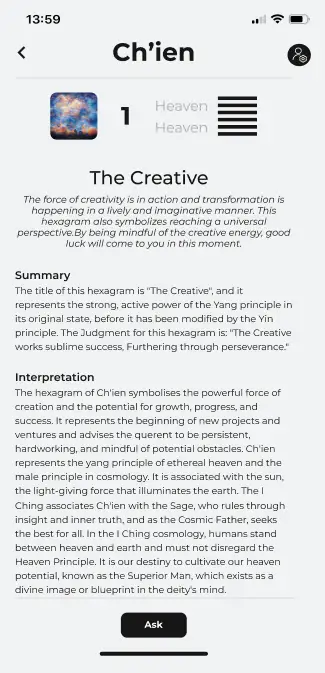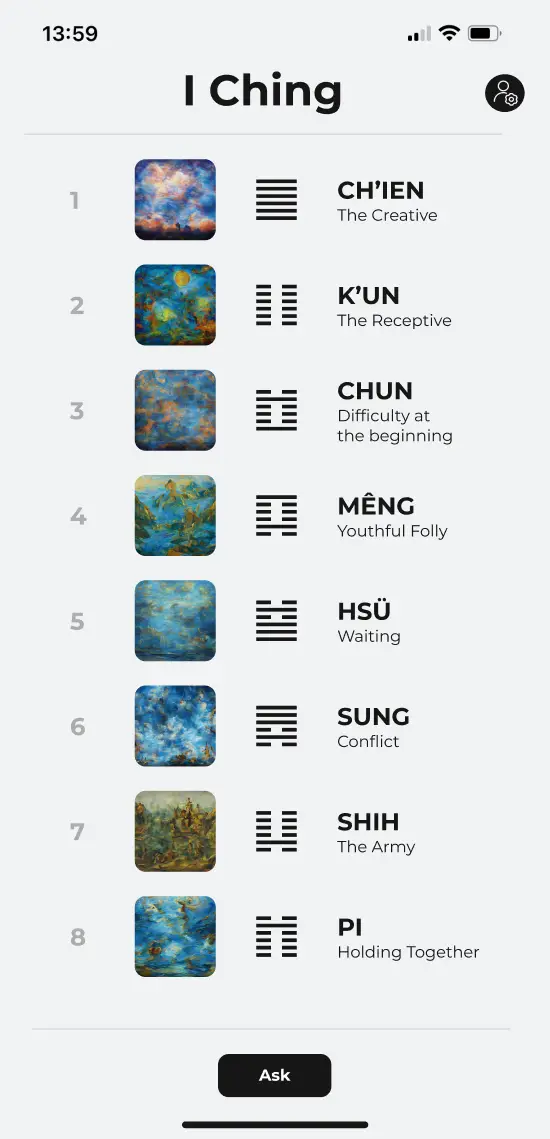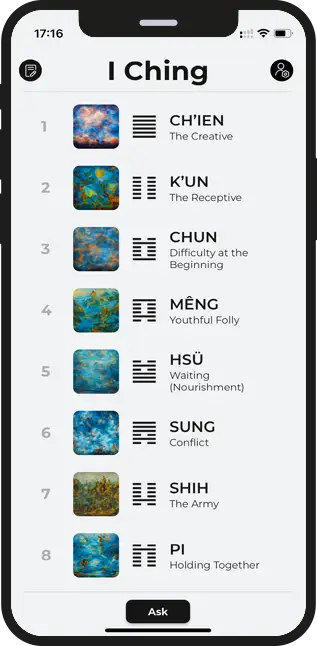
Fire
Wind
Hexagram 50 - The Caldron - TING
Embracing one's destiny and surrendering to divine guidance is a powerful act of humility and wisdom. By setting aside one's ego and embracing a higher power, one becomes an example and inspires others to do the same.
Summary
Hexagram 50 represents the image of a cauldron, a symbol of nourishment and nourishing influences. The cauldron symbolises a container that holds and supports growth and development. This hexagram is about finding balance and harmony in the home and community. It is about nourishing yourself and others and creating a supportive and nurturing environment for growth. The key takeaways from the judgment and image of this hexagram are to be open, attentive, and responsive to the needs of others and to create a nurturing environment for growth and development.
Interpretation
Hexagram 50, also known as the Ting, is related to Hexagram 48, The Well, where water symbolises effort and nourishes wood, symbolising character. The Ting continues this idea with a developed character nourishing fire, symbolising the potential within us. The hexagram emphasises sacrifice, which leads to our spiritual growth and, in turn, nourishes the divine. The Ting acts as a vessel for this sacrifice, and keeping our inner thoughts pure and modest is essential. This hexagram calls for the surrender of the ego, an illusion that prevents us from being guided by the Higher Power. We must relinquish inappropriate thoughts and deepen our humility and acceptance to listen carefully to the instructions of the Sage.
The Ting also reminds us that our inner thoughts are our offering to the Higher Power. To receive the best assistance, we must hold quiet, correct thoughts, and consciously let go of our resistance to life. This leads to continuous nourishment from the Creative.
Overall, the hexagram advises being open and responsive to the needs of others, creating a nurturing environment for growth and development, and balancing this with taking care of oneself. It emphasises the importance of humility, acceptance, and purity of thoughts, which enable us to be guided by the Higher Power and meet with good fortune in the outer world. The Ting is a reminder that we can attain spiritual growth through sacrifice, nourish the divine, and find balance and harmony in our lives.
Sage Advice
As we navigate life's challenges, it is essential to remember that our true power lies within us. Cultivating inner strength and resilience is critical to overcoming obstacles and achieving our goals. This requires a commitment to personal growth and development and a willingness to face our fears and overcome our limitations. The Sage advice from hexagram 50 encourages us to remain steadfast in our determination, even in adversity. Doing so allows us to tap into our inner resources and succeed on our terms. Ultimately, the best spiritual and sage advice from hexagram 50 is to stay true to ourselves and our values and to rely on our inner strength to guide us through life's challenges.
Line 1
The cauldron is upside down. This line advises us to let go of inferior elements within ourselves, such as pride, and to remain open-minded towards others even when they display their worst qualities. Often, we tend to hold on to negative impressions of people to guard ourselves against them, but this can become a barrier to their self-correction and a source of internal conflict for ourselves. It is not in our nature to hold onto negative memories; they can become "stagnating stuff" in our minds. Additionally, the desire to "be somebody" can stagnate, and it is essential to focus on doing worthwhile things instead. It is also vital to avoid seeking factionalism, as it can lead to others tolerating our bad habits and mistakes. Overall, the first line emphasises the importance of self-purification to achieve outstanding accomplishments. By letting go of inferior attitudes and habits, we create the possibility for growth and progress in our lives.
Line 2
Warns that possessing inner worth, stability, and independence can attract envy and rebellion from those who have not yet developed these qualities. Such individuals may test, probe, and challenge those possessing superior qualities to prove that their virtue is weak or fake. It is important to remain firm and not engage in self-defence or slander but to remain innocent and correct. Envy can manifest itself in unreasoning anger or servile attachment, and it is essential to maintain detachment and avoid being caught up in flattery or manipulations. By remaining true to ourselves and our values, we can prevent harm and continue toward inner growth and development.
Line 3
Suggests that our usefulness may be impeded due to our clinging to doubt and inner conflict, preventing us from attaining true spirituality. To let go of these hindrances, we must sacrifice our self-interest and cultivate modesty as the foundation of all other virtues. It is essential to avoid falling into the traps of righteousness and pride, as these can make our virtues ineffective. By maintaining a just and moderate view of humanity and combining it with humility, we can gain sublime power as a Sage. If we feel our influence is lacking, we should examine whether our ego is blocking us and hindering our progress. Ultimately, the superior person will be recognised in due time, and we can trust in the guidance and trustworthiness of the Sage to lead us towards true spirituality.
Line 4
Cautions us against becoming too wrapped up in ourselves and failing to remain in touch with our inner voice. If we neglect our character and the responsibilities that come with positions of influence, we risk humiliation and set a poor example for others. Genuine modesty involves remaining alert and maintaining contact with our inner selves so that our actions are pure and aligned with our path. It is essential to be mindful and not neglect our values or way of life, lest we stumble and fail to fulfil our potential.
Line 5
Reminds us of the importance of self-abnegation and remaining approachable. By sacrificing pride and self-defence, we can nourish others and serve higher purposes while receiving the help we need to overcome difficult situations. This requires us to stay strictly correct and not indulge in carelessness or wrongs in others. By remaining modest and open and retreating from what is inferior whenever it appears, we can attract the help we need in times of difficulty. The Ting, with its yellow handles and golden carrying rings, symbolises the importance of selflessness and correct behaviour in achieving success and positive outcomes.
Line 6
Reminds us to emulate the example of the Sage in our interactions with others. By maintaining our commitment to our path and persevering through obstacles with gentleness and purity, we can inspire others to do the same. Like jade, the Sage remains firm and unyielding but also retains a soft and gentle quality that draws others to them. By following this example, we can become a source of guidance and inspiration to those around us.








